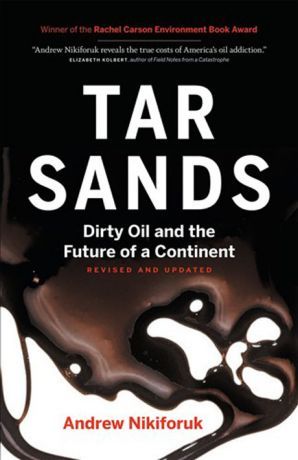Arts
You are here
Tar sands: Canada’s climate crime

July 25, 2013
With his book Tar Sands: Dirty Oil and the Future of a Continent, Andrew Nikiforuk provides a compelling and succinct condemnation of the world’s largest energy project.
In well-organized chapters, Nikiforuk takes us through a systematic account of why the Tar Sands are simultaneously so addictive to the Canadian government and so dangerous for the rest of us.
The books, which is highly critical of the continual growth model of economic development, notes that Canada has done little compared to other fossil fuel-rich countries, like Norway, to tax and sequester the revenue from resource extraction to fund clean-up and alternatives. The tar sands are unsustainable both environmentally and economically, taking one barrel of refined oil to retrieve four barrels of Tar Sands sludge. This has led to terrifying ideas such as nuclear-powered extraction.
What stands out so glaringly in the pages of Tar Sands is just how incredibly cozy the Alberta and federal governments are to the oil industry and how far they will go to maintain that relationship. The story of Dr John O’Connor stands out amongst the many reports of government agencies rubber-stamping new extraction sites and ignoring health warnings. Dr O’Connor tried to sound the alarm about the bile duct cancer of people living downstream from Fort McMurray in Fort Chipewyan, but was charged by members of Health Canada, the Alberta Cancer Board and Alberta Health with causing “undue alarm” among the public, silencing his research.
In one of the most fascinating chapters, Nikiforuk details the human toll that resource extraction has had on Fort McMurray and boom towns across North America. There is the long hours, the drug addiction, the inflation, sky-high domestic abuse statistics; stories of people coming to cash-in on the tar sands and living in their cars, while experiencing record levels of cancer, asthma and waiting in hospitals that are extremely underequipped to deal with the influx of patients. The strength of this chapter rests on the heart-wrenchingly human stories of long-time Fort McMurray residents, oil workers, spouses and doctors.
While Nikiforuk condemns the dangerous conclusions of the Canadian government and the energy industry, his solutions tend to veer into the nationalistic and moralistic at times. He repeatedly compares Canada’s relationship to the tar sands to the supposed moral failings of a person addicted to drugs and alcohol. He emphasizes the personal choices of “powering down and eating local.” He criticizes environmentalists for labeling the Tar Sands a climate crime and wanting to shut down the entire development, while arguing that the “real crime” is millions of people driving in their cars everyday. Not placing the division between the working class and the ruling class at the heart of the analysis leads to false solutions like advocating for heavy carbon taxes that would disproportionately affect the those most exploited and oppressed by the tar sands, tinkering with policy for a better “energy sovereignty” from the US, condemning nationalization in favour of fairer taxes on corporations while expecting those mega-corporations to accept a slow-down in tar sands development and a cap at two million barrels a day.
But this book is a must-read. It is clear throughout that resource booms constrict democracy and place an incredible amount of power in the hands of the petroleum companies and politicians beholden to them. A mass movement in the workplaces, in the communities, on the First Nations reserves, can challenge that power—demanding renewable energy and using petroleum profits to reclaim damaged wetlands, reduce carbon emissions and employ millions. A challenge to the tar sands has to champion the power and voices of those poisoned by the tar sands, whether downstream or driving the upgraders.
If you like this article, join the discussion “Tar sands: why is capitalism killing the planet” Saturday July 27 in Toronto.
Section:










